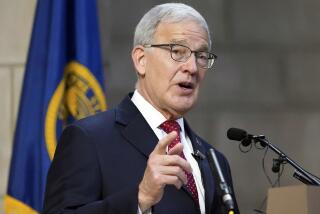S. African Court Unlocks Ballot Box to Prisoners
- Share via
JOHANNESBURG, South Africa — Of the many democratic changes since this country’s first multiracial elections in 1994, South Africans are especially proud of their new constitution.
The document not only enshrines basic rights such as those in the U.S. Bill of Rights, but bars discrimination based on race, age, gender and sexual orientation. It even addresses the right to water, housing and health care.
Now, to almost everyone’s astonishment, the country’s highest court has determined that the far-reaching 1997 constitution goes even further than imagined: The document guarantees South Africa’s 146,000 prisoners the right to vote in the upcoming national elections.
“The first thing I thought was that it was an April Fools’ joke,” said Barry Eksteen of the Department of Correctional Services. “But then anything can happen here.”
With the June 2 elections less than two months away, the Constitutional Court has given election officials until next Friday to come up with a voting scheme for the country’s 93,000 convicted prisoners and 53,000 inmates awaiting trial. Until now, the prison population had been excluded from balloting plans and had not been targeted in registration drives.
The court’s list of newly eligible voters does not discriminate on the basis of offense: Convicted murderers and suspected shoplifters are equally enfranchised. In essence, no one can be left out because of a criminal record, the court said.
“Universal adult suffrage is one of the foundational values of our constitutional order,” the Johannesburg-based court ruled last week. “The vote of each and every citizen is a badge of dignity and personhood. Quite literally, everybody counts.”
The ruling has caught almost everyone off guard. The Independent Electoral Commission, which is running the June vote, is studying the decision but will say little.
The commission is so short of cash that it had already decided not to allow South Africans living or working abroad to vote. Until recently, it was even intending to exclude college students and businesspeople not in their home voting districts on election day, a decision that has been reversed. Officials say it is unclear where they will find the money to accommodate inmates at 233 prisons nationwide.
“Our position is that voting must be allowed for all South Africans, but it depends on the logistics and the complexity of the process,” said Smuts Ngonyama of the ruling African National Congress, whose members dominate the election commission. “It is a question of resources.”
Most opposition parties have jumped on the Constitutional Court’s ruling as an opportunity to mock the commission--which has suffered a series of blunders in the run-up to the elections--as well as the ANC, which legal experts say could have averted the problem with legislation. In 1994, in the country’s first multiracial elections, the issue was sidestepped by a special provision barring prisoners convicted of violent crimes from voting.
Several opposition groups also have gone to court this month to challenge the commission’s ruling against overseas voters. Some have even pointed out that apartheid-era murderer Eugene de Kock, behind bars for life, will now be able to vote, but that national sports star Hansie Cronje, who will be in Britain for a cricket tournament on election day, will not.
“It is just madness to suggest that somebody in a maximum security prison should be accorded the right to vote,” said Douglas Gibson, of the opposition Democratic Party.
The main praise for the new suffrage has come from the prisoners and their advocates. Golden Miles Bhudu, who heads the South African Prisoners’ Organization for Human Rights, said the ruling has given new hope to the incarcerated. Recent regulations have taken televisions and other perks away from most inmates, and prison marriages also have been banned.
“The prisoners were beginning to feel as if they were no longer regarded as human beings,” Bhudu said. “When you lose the right to vote, you are virtually no longer a citizen of your country.”
Bhudu will resign his advocacy post at the end of this month to take up politics: He is running for Parliament with the opposition United Democratic Movement on a prisoners’ rights platform. He said he is counting on at least 146,000 votes.
More to Read
Sign up for Essential California
The most important California stories and recommendations in your inbox every morning.
You may occasionally receive promotional content from the Los Angeles Times.













